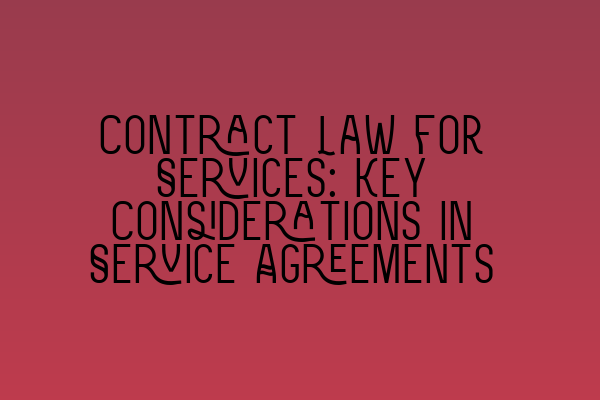Contract Law for Services: Key Considerations in Service Agreements
Welcome to our blog post on contract law for services. In this article, we will discuss some key considerations in service agreements. Whether you are a service provider or a client, understanding the important aspects of service contracts can help you protect your rights and ensure a smooth business relationship.
1. Scope of Services
The first and foremost consideration in a service agreement is defining the scope of services. Clearly outlining the tasks, responsibilities, and deliverables expected from the service provider will eliminate any potential ambiguity or misunderstandings.
To ensure the scope is properly defined, make sure to include specific details such as timelines, milestones, and performance standards. This will provide a solid foundation for the agreement and help both parties understand their obligations.
2. Payment Terms
Payment terms are another critical aspect of service agreements. Clearly stating the payment amount, frequency, and method of payment will help avoid disputes down the line. Additionally, consider including provisions for late payment penalties or interest to incentivize prompt payment.
Our related article on SQE 1 Practice Exam Questions can provide you with further insights on payment terms and their impact on contract law.
3. Intellectual Property Rights
In the service industry, intellectual property rights can be significant. It is essential to clearly define who owns the intellectual property created or used during the provision of services. Whether it is copyrights, patents, or trade secrets, both parties should agree on the ownership or licensing terms.
Our related article on SQE 1 Practice Mocks FLK1 FLK2 dives deeper into intellectual property rights in the context of contract law.
4. Confidentiality and Non-Disclosure
When dealing with sensitive information or trade secrets, confidentiality and non-disclosure provisions are essential. Clearly outlining the obligations to maintain confidentiality can prevent unauthorized disclosure of proprietary information.
Be sure to include the consequences of a breach of confidentiality, such as indemnification or injunctive relief, to deter potential violations.
5. Termination and Dispute Resolution
Termination and dispute resolution clauses should also be included in service agreements. Clearly defining the circumstances and process for termination protects the interests of both parties.
Similarly, including a dispute resolution mechanism, such as mediation or arbitration, can save time and costs if disagreements arise. Think about incorporating a choice of law and jurisdiction clause to determine which laws and courts will govern the agreement.
For further information on dispute resolution, you may find our related article on SQE 2 Preparation Courses beneficial.
Conclusion
Service agreements play a crucial role in regulating the provision of services. By considering the scope of services, payment terms, intellectual property rights, confidentiality, and termination provisions, you can create a comprehensive and clear agreement that protects your interests.
If you want to deepen your knowledge on contract law, be sure to check out our related article on SQE 1 Preparation Courses and stay updated on the latest SRA SQE Exam Dates.
We hope this article has been helpful. If you have any questions or need assistance with your service agreements, don’t hesitate to reach out to us at SQE Contract Law.
